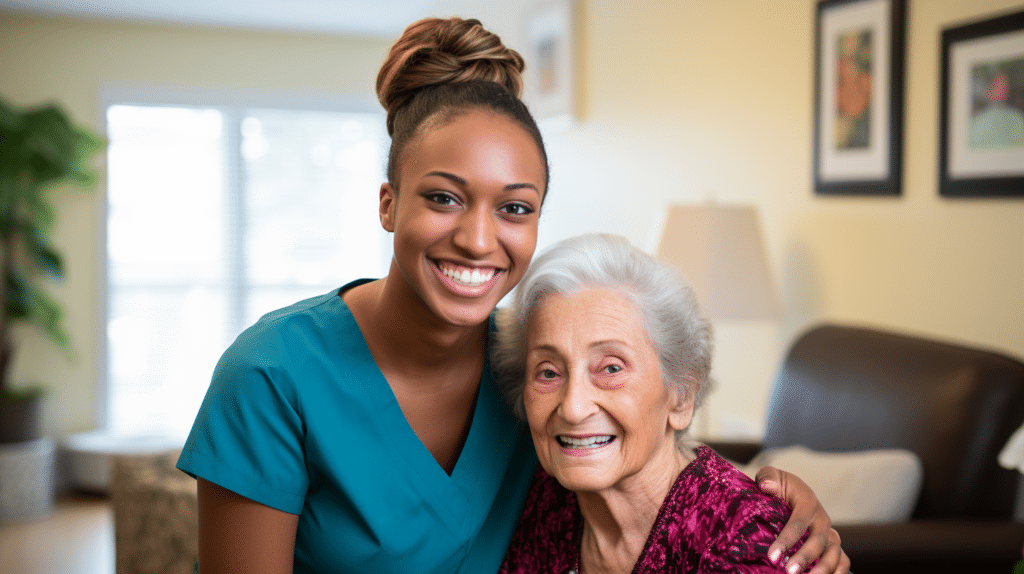Companion Care at Home
Let's Get Started!
Get Immediate Help on Info & Pricing
Finding Meaningful Support and Connections Through In-Home Services
As we get older, having a companion who provides meaningful support and connections can make all the difference in our lives. Companion care delivered in the familiarity of home enables seniors to have engaging days while receiving assistance with daily tasks. Understanding companion care and how it differs from personal hands-on assistance empowers families to make the best care decisions.
What is Companion Care at Home?
Companion care consists of in-home support services that prioritize seniors' social and emotional well-being. Also called homemaker services, this type of care is focused on providing:
- Friendly companionship and conversation
- Engaging activities matched to interests and abilities
- Assistance with household tasks like cooking, cleaning, laundry
- Transportation to appointments and community outings
- Medication reminders and safety checks
- Pet care assistance
Unlike personal hands-on care, companion services aim to reduce isolation and foster a sense of purpose. Building genuine rapport and trust between caregiver and senior is a top priority. Caregivers become familiar faces to offer comforting company each day.
Qualities of Companion Caregivers
Compassionate companion caregivers possess these qualities:
- Warm and friendly nature
- Active listening skills
- Ability to engage seniors based on their individual personalities and backgrounds
- Reliability and responsibility
- Understanding of senior safety needs
- Knowledge of dementia support techniques if applicable
Their personable and patient approach helps seniors feel at ease. Companions go the extra mile to connect and brighten spirits.
Overview of Companion Care Services
Some primary services provided by companion caregivers include:
Conversation and Activities - Caregivers engage seniors in their hobbies like gardening, crafts or card games. They also chat, reminisce and keep minds stimulated.
Meal Preparation – They plan and cook healthy meals tailored to dietary restrictions and food preferences.
Medication Reminders – Caregivers provide prompts to take medications on time and assist if needed.
Light Housekeeping – They handle chores like laundry, dishes and tidying up to maintain a clean home environment.
Transportation – Companions accompany seniors to medical visits, religious services, shopping trips and social engagements.
Pet Care – They assist with feeding, walking or cleaning up after pets if needed.
Though not hands-on, these supportive services enable seniors to live comfortably at home.
How Companion Care Differs from Personal Hands-On Care
Companion care takes a different approach than personal care, which involves intimate hands-on help with:
- Bathing
- Dressing
- Grooming
- Toileting
- Transferring
- Eating
While personal care is focused on assisting with these daily activities, companion services prioritize:
- Socialization
- Engagement
- Conversation
- Developing rapport
Companions provide specialized support but not intimate physical care. The two can be combined for seniors needing both socialization and personal assistance.

Benefits of Companion Care for Seniors' Well-being
Companion care offers many therapeutic benefits that enhance seniors' quality of life:
Reduced Isolation – The companionship and engaging activities lower the risks of loneliness and depression.
Increased Safety – Regular visits provide safety checks, medication reminders and emergency access if needed.
Cognitive Stimulation – Activities exercising the mind may help delay cognitive decline.
Improved Mood – Seniors feel happier with positive social interaction and assistance with tasks.
Enhanced Purpose – Caregivers motivate seniors to pursue hobbies, interests and passions.
Emotional Support – Companions provide a listening ear and reassuring presence.
With personalized in-home assistance, seniors can comfortably age in place and make meaningful connections.
Offering Family Caregivers Needed Respite
Caring for aging loved ones often falls on family members, leading to burnout and emotional strain over time. Having companion caregivers provide seniors regular support offers family members periodic respite so they can:
- Recharge from caregiving demands
- Attend to personal needs
- Reduce stress
- Spend time with other family
- Return to caregiving duties renewed
Knowing their loved one is happily engaged with a companion provides comfort. Companion agencies give family caregivers access to lasting assistance and peace of mind.
Selecting a Companion Care Agency
When choosing an agency, consider their:
- Screening process for hiring compassionate companions
- Training on dementia, safety, engagement, and other senior needs
- Communication with families on seniors' daily status
- Backup plan if a caregiver cannot make their scheduled visit
- Experience assisting seniors in maintaining independence
By asking these key questions, families can find an agency providing meaningful companionship and days filled with connection. Companion care services enable seniors to happily and comfortably age at home.

